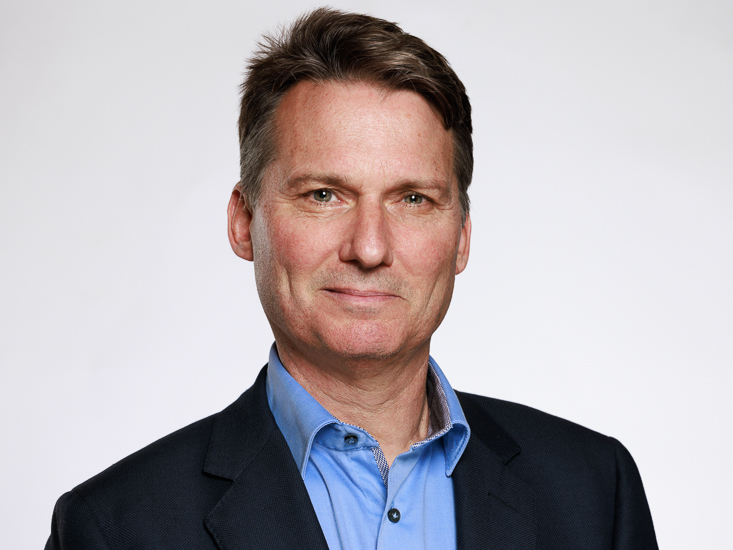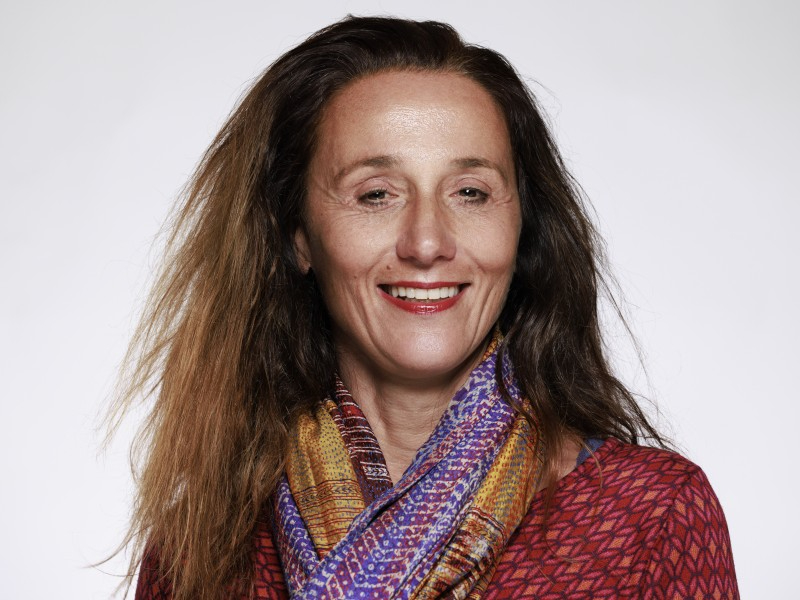Share post now
Reportage
Rooms with a view
06.12.2023, Finance and tax policy
In November, a large majority of UN member states agreed to a UN Framework Convention on Taxation. In the run-up, our tax policy expert toured the city of New York and the institution.

Intense Canadian forest fires envelop the George Washington Bridge in a haze that colours the sky a yellowish-grey.
© Seth Wenig / AP Photo / Keystone
I had picked up a pair of wellingtons at Zurich airport. A day before I landed in New York, the city was under water. A heavy autumn downpour had flooded large parts of the US metropolis on the Hudson. One airport had to be closed and subway tunnels had filled up. News reports around the world showed images of people sitting on traffic lights, staring down at swirling water, where restaurant furniture bobbed up and down and cars floated by. From a distance, one might have thought New York had been engulfed by the Flood.
The Global South in the northern metropolis
A day later, I sat with my colleagues from the Global Alliance for Tax Justice on the terrace of a Mexican restaurant in Midtown Manhattan, not far from the United Nations headquarters. We were in T-shirts – it was uncannily mild for early October. The next day we were to attend the deliberations of the Second Committee of the UN General Assembly, where representatives of 193 nations were discussing a new tax convention. There was not so much as a puddle to be seen in this part of the city. In an earlier email, our Indian colleague had put the globally covered, local weather event into perspective: "In my part of the world, we would call it a 'light monsoon shower'." Apparently, when transmitted via the web, the world sometimes looks even worse than it is in reality – at any rate when it comes to the weather.
But the fact is that New York's drainage systems are sometimes in such a poor state that they can no longer cope with even relatively small amounts of unusual rainfall. This is especially true of areas outside of Manhattan, the city's most developed and wealthiest section. My Indian colleague told me that she had spent the day in Midtown, rushing from one meeting to the next, completely undisturbed by the water. As such, rainfall in New York also shows up the inequities existing between the city's neighbourhoods.
Water poses a major problem for New York, especially in the long run, a subject that receives very little attention in global news coverage. Owing to climate change, the New York coastline has seen a sea-level rise of 30 centimetres since 1900. A further 1.5 metres rise is predicted by the end of the century. Heavy downpours will increase owing to rising temperatures over the Atlantic. The New York Times recently reported that the rising sea level will force 600,000 of the city's inhabitants out of their homes by the end of the century. Just imagine all of Zurich and Geneva disappearing into the sea.
Lack of money in the fight against water
Due to jetlag, I was already up at six o'clock during the first few days in New York, wandering around the city for a few hours before beginning our meetings with the UN representatives of various countries. I walked through old subway stations and along Brooklyn's semi-abandoned docks. Being so close to the sea, the neighbourhoods in the south of the city are the ones most exposed to flooding. The New York Times has reported, for example, that in Far Rockaway, a neighbourhood in the borough of Queens and home mostly to working and lower middle-class people, residents are already moving out to make way for the water. Away from the smooth and glittering facades in Midtown or the Financial District, infrastructure is in decline everywhere. In New York's public spaces, things are corroding and crumbling. It is hard to imagine the required adaptations to the rapidly changing climate being done in good time here, even though the city has an adaptation plan (AdaptNYC) and a sustainability plan (Plan NYC2030 – A Greener Greater New York).
Former police officer and now Democrat Mayor Eric Adams has just requested funds from Washington to assist migrants from Central and South America who are now arriving in New York in much greater numbers than in years past. The city lacks the funds needed to provide enough decent accommodation even for these people alone. Climate adaptation and migration spending are therefore two of the biggest challenges facing New York in the decades ahead. The "migration crisis" is also being blamed on irresponsible Republican governors in the southern United States. Some are sending new arrivals from Mexico directly to New York. Texas handed out New York-bound bus tickets to 42,000 immigrants, of whom 15,300 are thought to have already arrived. For current spending alone, the city faces a $8.3 billion shortfall for the rest of the year. In reality, this is absurd, as it is the world's richest city, and home to 340,000 millionaires, 724 people who own more than 100 million, and 58 billionaires. At the same time, poverty is also high: in 2021, almost a fifth of New Yorkers were living in poverty and a third were struggling to cover essential costs such as housing, food, education for their children, or health insurance.
While riding the cable car one morning from Roosevelt Island back to Midtown, I struck up a conversation with a young Wall Street computer scientist. Every morning, he, his wife and their young daughter take the cable car across the East River to Manhattan on their way to work and kindergarten. He must have been thinking of these social conditions when he told me that – having come from modest circumstances in Queens – they now live in a flat on the quiet, well-kept island. A privileged life. "But I'm still a long way from those over there", he said, pointing to the tops of the Midtown skyscrapers gleaming in the morning sun, "a very long way."
Extreme social inequality, significant climate risks but not enough funds for climate adaptation and adequate infrastructure for immigrants: in essence, this city is a society like those we know from emerging countries. The Global South also manifests itself in the North's most glitzy metropolis. To alleviate inequality and hardship among the poor and promote climate adaptation and mitigation, the city urgently needs more tax revenue. Higher taxes on large fortunes, corporations and capital gains could make a difference: 28 trillion dollars were traded on Wall Street in 2022. However, the smart spenders from the Office of Management and Budget hold sway in the city government, as reported by Politico.
EU orchids
My colleagues from the Global Alliance for Tax Justice and I had come to New York to do our part in helping to achieve success for a UN framework convention on tax policy, which could signal the demise the OECD as the dominant multilateral organisation for international tax policy. In a ten-year reform cycle, the club of rich Western countries has not managed to distribute corporate tax revenue more fairly, despite formally including some Southern countries in the process. The UN could change the dynamics entirely in this regard. I therefore spent a week going from country mission to country mission together with my Danish and New Zealand colleagues. Most of the missions are located in a semi-circle around the UN headquarters on the East River. We want to convince as many OECD Member States as possible to support calls from African countries for a framework convention to be drawn up. Our colleagues from Ethiopia and India are in dialogue with these latter countries.
However, not much could be achieved at the EU mission, whose office windows offer a view, over potted orchids on the ledges, all the way down Third Avenue to the "One World Trade Centre". One of their French representatives argued that there was "duplication" of OECD tax processes and a lack of tax policy expertise and resources at the UN. We were really not pleased to hear that because, first, a UN tax convention would be something completely different from the OECD's "Inclusive Framework", especially from the viewpoint of countries in the Global South that are producers for multinational corporations. Although the OECD now allows them to sit at the table, the rich Northern countries are still dominant. In the UN, however, the balance of power between North and South is more equitable. The matter of resources depends on the political will of the rich countries to endow the UN accordingly. Such "arguments" are therefore no more than rhetorical window dressing. Yet they are being wielded by most OECD countries. It is a way of disguising their material interests. The fact is that under a new UN tax system which fairly distributes tax revenue from the profits of multinational corporations around the world, the old corporate headquarters in the North would inevitably lose out. Global transparency in the offshore system for private assets would also complicate the business dealings of the traditional financial centres of the North. This is especially true of Switzerland, which, it is said in New York, would like nothing better than to drown that entire UN process in the East River. But there are also exceptions among the OECD countries. For high-tax countries such as Denmark or Norway, UN backing could also mean additional revenue. Accordingly, the conversation with the Danish representative at the impressive sushi restaurant was rather "hygge" – the Danish concept denoting a feeling of cosiness and contentment.
More "hygge" for the world
On the last day of my UN visit, I sat on a wide, soft armchair in a chilly foyer at the headquarters and wrote UN postcards from the 1980s. Qatar had set up shop there: the walls were lined with display cases containing golden oasis models. A floor-to-ceiling window façade offered a view of the East River and the ever-burgeoning skyscrapers on a Brooklyn waterfront. The ornate fitted carpet absorbed all sounds, and negotiators dozed in armchairs next to me. "The world is gripped by disasters and wars, yet here at the UN, international tax policy, at any rate, could soon become a little fairer," I wrote on a postcard. Perhaps the power brokers in the North will, after all, recognise the signs of the times overcome their love of the status quo and start sharing power and tax revenue more fairly. The world could indeed use a little more "hygge".
Article, Global
Greater effectiveness through modesty
03.10.2023, International cooperation
Fragile statehood is one of the biggest obstacles to effective and sustainable poverty alleviation. Alliance Sud has discussed the opportunities and limits of international cooperation in fragile contexts with Professor Christoph Zürcher.
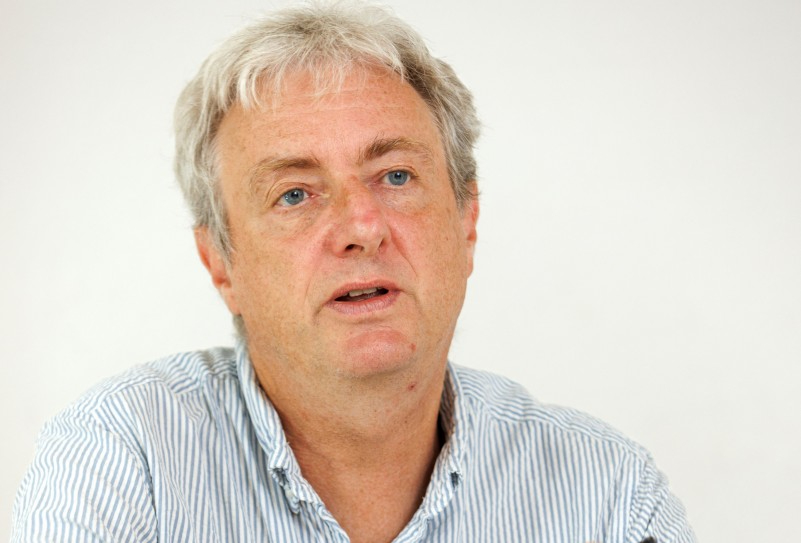
Christoph Zuercher is a professor at the Graduate School of Public and International Affairs at the University of Ottawa. As a political scientist, he conducts research and lectures on peacebuilding, international relations and international cooperation, with a regional focus on the former Soviet Union, especially Russia, the Caucasus and Central Asia. In his most recent work he focused mainly on assessing the impact of international cooperation in fragile contexts.
© Daniel Rihs
Share post now

global
The Alliance Sud magazine analyses and comments on Switzerland's foreign and development policies. "global" is published four times a year (in german and french) and can be subscribed to free of charge.
Article
The energy transition and its minerals
21.06.2022,
The invasion of Ukraine by Russian troops has thrown energy markets and geopolitics into chaos and forced many countries to rethink their energy supply arrangements. Over time, the race for “green minerals” will create new dependencies.
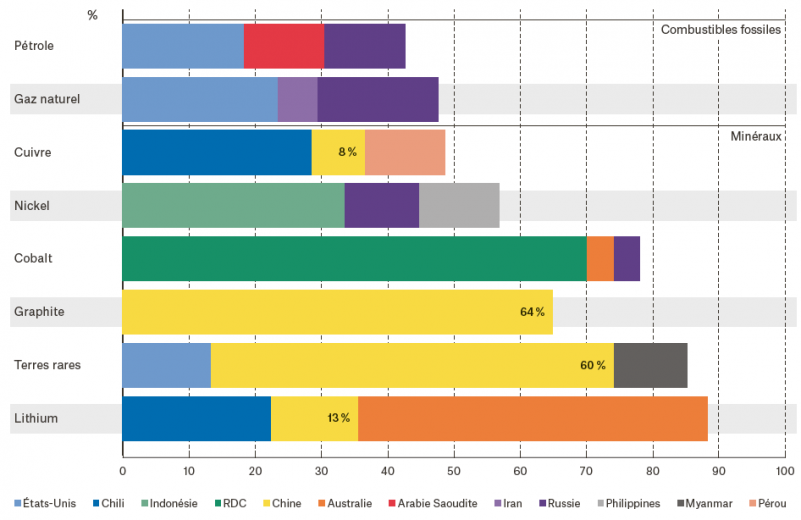
Share of the three largest producing countries in the extraction of selected minerals and fossil fuels, 2019 (Source: IEA) © Alliance Sud / global
According to the International Energy Agency (IEA), Russia is the world’s biggest exporter of oil, and its natural gas supplies the European economy. The USA, EU and other countries have imposed economic sanctions on Russia and announced their intention to cease using fossil fuels from that country; the G7 Heads of State and of Government have committed to banning or phasing out imports of Russian oil.
The war has prompted political decision-makers to reconsider their energy plans and, in many respects, this could have far-reaching implications, for example, in terms of the looming food crisis, or worldwide endeavours to reduce greenhouse gas emissions.
The energy crisis
The key question that the world’s leading politicians are now pondering is how to end their energy dependence on Russia. The USA and the United Kingdom have been the first two major countries to ban Russian oil, though their dependence on these imports is only negligible. The EU imported about 45% of its natural gas, more than a quarter of its oil and about half of its coal from Russia in 2021. However, this is likely to change. Following the embargo on Russian coal imposed in April, the European Council decided on 30 May to stop 90% of Russian oil imports by the end of 2022 - with a transition period for Hungary - and the EU aims to reduce its Russian gas imports by two-thirds this year and by 100% from 2027. At the end of March, US President Joe Biden promised to supply Europe with more liquefied natural gas. Europe’s policymakers also held talks with Japan and South Korea about redistributing liquefied natural gas that would otherwise have been intended for these two countries.
On the one hand, the spectrum of options for safeguarding EU energy security in the short-term could include greater use of coal-fired power plants, especially in Germany; on the other, they should be helping to speed up efforts to transition to cleaner energy, especially through increased investment in energy efficiency.
Longer term outlook
The next few years may well be difficult, but they could have positive long-term impacts on energy policy and greenhouse gas emissions in Europe. The electricity sector is subject to the European trading system, which caps cumulative carbon emissions so that a temporary spike in electricity production, from coal for example, would drive up the price of CO2 credits and lead to emission reductions elsewhere.
At the global level, the energy situation is less clear. The war in Ukraine could slow down the energy transition in other parts of the world and drive up greenhouse gas emissions. There could be a significant return to the use of coal, especially in south-east Asia, if Europe effectively corners the international liquefied natural gas market for itself. Then, there is still Russia itself, which accounted for almost 5 per cent of worldwide emissions in 2020 and, in view of its current priorities, will probably make no progress in decarbonization. China, for its part, has announced its intention to increase coal consumption in 2022 to support economic recovery, despite its undertaking to reduce CO2 emissions.
From petrostates to electrostates
Beyond this, the net-zero target set for 2050 will lead to a shift in power from oil- and gas-producing countries to countries that have ample endowments of the commodities needed, for example, to build power networks, batteries and solar panels. The IEA estimates that by 2050, 70 per cent of electricity production could come from renewable sources, which is a massive increase over the current 9 per cent.
The principal elements required for this transformation are a series of minerals including copper, cobalt, lithium, manganese and several rare earths. The IEA has predicted a massive spike in demand for these “green minerals” between 2020 and 2040.
The energy transition holds out the prospect of colossal profits for countries with substantial metal deposits. According to the International Monetary Fund (IMF), the prices of these metals are expected to hit unprecedented and historic highs over a protracted period; the prices of cobalt, lithium and nickel could rise by several hundred per cent compared with 2020 figures. This is undoubtedly bad news for the energy transition. Commodity shortages and the rise of commodity prices could very adversely impact growth, more specifically the sale of electric vehicles. For countries that possess these metal reserves, in contrast, this development would be a blessing, in that it would alter the international financial flows generated from natural resources.
New dependencies and… well-known drawbacks
The production of many of the minerals that are critical to the energy transition is geographically more concentrated than that of petroleum or natural gas. To simplify somewhat, the countries with “green minerals” fall into three categories: Western democracies (such as Australia, which accounts for 52 per cent of lithium production); authoritarian regimes (the Democratic Republic of the Congo produces 69 per cent of cobalt, China 64 per cent of graphite and 60 per cent of rare earths, Russia, 11 per cent of nickel); and democratic emerging countries (like Indonesia, which has 33 per cent of all nickel deposits, Chile, which produces 28 per cent of copper and 22 per cent of lithium, or Peru, which extracts 12 per cent of the world’s copper). Overall estimates are that 50 per cent of “green minerals” are under the control of autocratic or authoritarian regimes. When it comes to further processing, the degree of concentration is even higher, with China being strongly represented in all areas.
This throws up the key question of whether the governments of these mineral-rich countries will harness the growing global demand for and rising prices of these commodities for their own benefit and promote inclusive development by fairly distributing the income generated among their citizens, through appropriate forms of governance. Or whether history will repeat itself, with these countries falling victim to the resource curse. To manage the exploding demand for metals, the IMF suggests that a new international institution be created, similar to the IEA for energy, which could play a key role in the dissemination and analysis of data, industry standards and international cooperation.
Besides, many of the companies that extract these metals face constant accusations of human rights violations and environmental degradation. According to the Transition Minerals Tracker of the Business & Human Rights Resource Centre, which oversees the human rights policy and practice of the companies that mine six commodities relevant to the energy transition (cobalt, copper, lithium, manganese, nickel and zinc), almost 500 cases of suspected human rights abuses were observed between 2010 and 2021, with 61 in the year 2021 alone.
(Some) reason for hope
According to some experts, the good news is that by 2050, roughly 40 to 75 per cent of the EU’s needs could possibly be met through recycling, if the major “green metal”–consuming countries make timely investments in infrastructure and scale up their mandatory recycling quotas.
The energy transition and the resulting new geopolitics may therefore be marked by volatility and turbulence, and bring major challenges both for countries that are rich in “green minerals” and for those that depend on them.
Share post now
Article
Is the greenwashing fog about to clear?
30.09.2022, Finance and tax policy
In late May, public prosecutors in Frankfurt searched the offices of Deutsche Bank and its asset management subsidiary DWS. The reason was presumed greenwashing practices. Time to ensure greater clarity in also Switzerland.
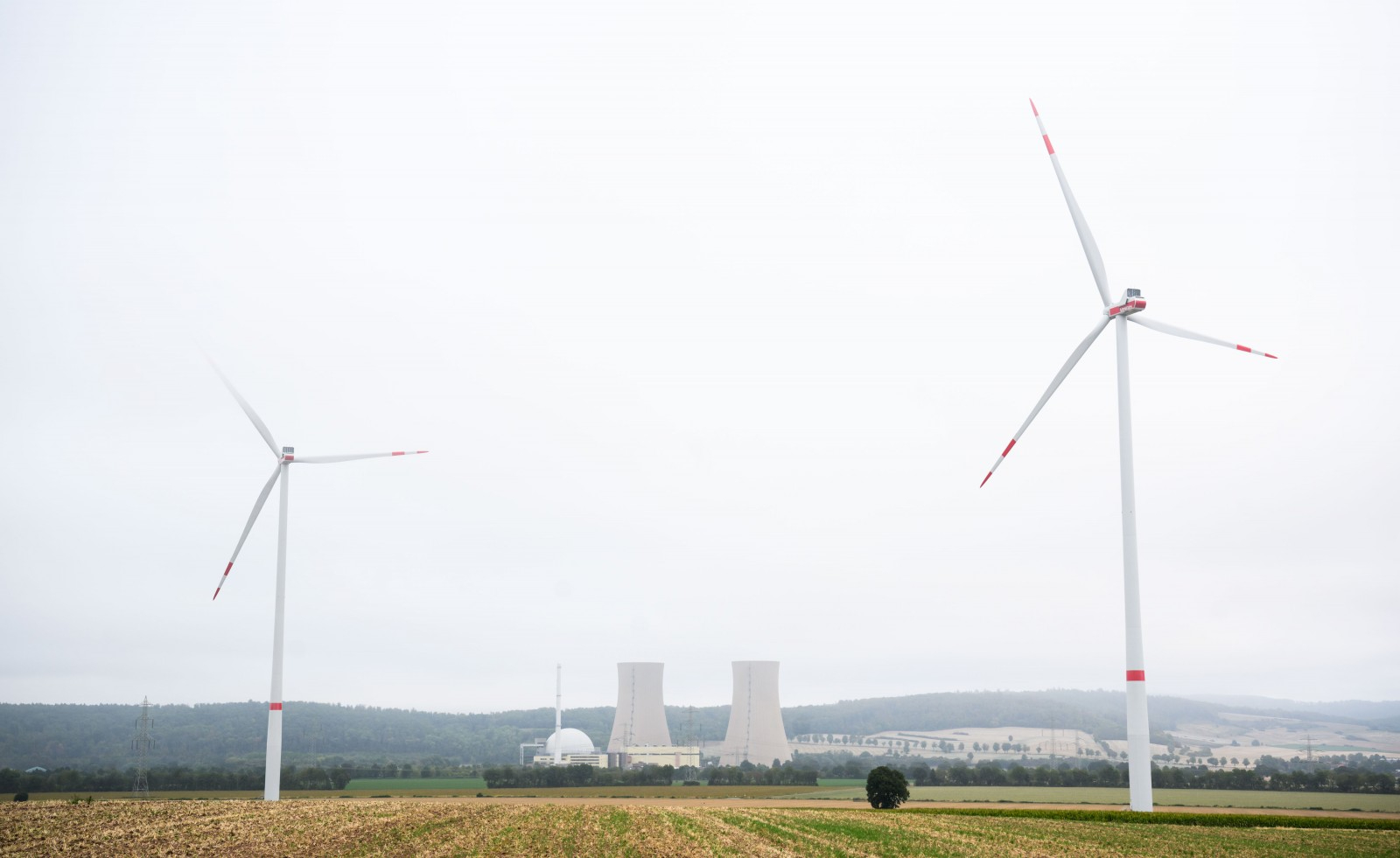
Wind turbines near the decommissioned nuclear power plant Grohnde, Lower Saxony. – The European Union wants to label investments in nuclear energy as "green", environmental organisations criticise this sharply.
© Foto: KEYSTONE / DPA / Julian Stratenschulte
Greenwashing accusations against DWS have been rife for months now. The specific accusation is that asset managers have been exaggerating the sustainability of DWS products as regards environmental protection and climate change. According to the Public Prosecutor's Office, sufficient evidence has been found to show that ESG criteria (environment, social, governance) are being observed only for a fraction of investments.
Last year, the US Securities and Exchange Commission (SEC) and the German Federal Financial Oversight Authority (BaFin) launched separate investigations into allegations by a whistleblower that DWS was selling its funds as more environment-friendly than they in fact were. The greenwashing allegations that came to light in August sent DWS shares plunging by more than 20 per cent, and precipitated the resignation of CEO Asoka Wöhrmann.
And what is the situation in Switzerland?
This case was viewed as a shot across the bow of the entire finance industry, which is under regular suspicion of engaging in greenwashing practices. Here in Switzerland too, the Swiss Financial Market Supervisory Authority (FINMA) is now taking an interest in communication relating to financial products: it now conducts more inspections in an effort to combat misleading advertising with "green" promises.
Recent years have witnessed a substantial rise in demand from clients and investors for sustainable financial products and services – coupled with the danger that clients and investors could be deceived about the supposed sustainable properties of financial products and services (financial products labelled "sustainable", "green" or "ESG").[1] Greenwashing is the term applied when customers of financial institutions are knowingly or unknowingly deceived or given misleading information about the sustainable properties of financial products.
FINMA's tasks include protecting financial market clients and investors from improper business practices, especially deception. FINMA investigations have now produced clear evidence of greenwashing practices in the sale of financial products and services, and determined that providers often make "vague to misleading promises" about their products.
To counter the risk, transparency around sustainability must be enhanced as a matter of urgency, by introducing standardised requirements and indicators, classifications (taxonomy) and methods for gauging the positive and negative impacts of investments on the climate and on sustainable development. Under the Paris Climate Agreement, Switzerland assumed commitments that also apply to its financial centre.
No specific legislative basis
There are currently no specific transparency-related provisions governing products and services that are described as "sustainable". Only general rules apply, including the prohibition of deceptive practices in connection with collective investment schemes (investment funds). Investors should be in a position to make well-founded investment decisions, including in the cases of products declared as "sustainable". FINMA published guidelines in November 2021, laying out the information that Swiss funds must provide in the documentation when they are declared as sustainable. When applying for authorisation, those funds are required to supply additional information as to the sustainability goals being pursued, their implementation and the expected impacts. This enables FINMA to better assess whether there is deception and to take appropriate action.[2]
Despite this, FINMA has only limited leeway for effectively preventing and combatting greenwashing. There are no specific sustainability-related transparency obligations and effective control parameters on which basis to take measures. Only additional regulatory measures would provide FINMA with the tools it needs to be able to combat greenwashing more comprehensively and effectively.
Let us not forget the Federal Council’s announcement, in late 2021, of its intention to make Switzerland a market leader in sustainable financing. At the time it urged financial market players to strive for enhanced transparency by introducing comparable and meaningful climate compatibility indicators that would enable investors to classify and select investments according to their impacts on the climate. In that context, the Council unveiled “Swiss Climate Scores" in late June, and recommended their use by financial market players purely on a voluntary basis.
By the end of 2022, the Swiss Federal Departments of Finance and the Environment (FDF and DETEC) are expected to produce a report on the implementation of these recommendations by the financial sector and – in conjunction with the FINMA – to table concrete suggestions on changes that are needed to financial market legislation in order to avoid greenwashing.
Considering the significance of the Swiss financial centre, the Federal Council would be well advised to bring forward an ambitious and future-ready regulatory framework which, at the very least, incorporates the relevant EU regulations. This could curb greenwashing practices so that financial flows from Switzerland could be credibly and measurably redirected – for the benefit of the climate and sustainable development.
[1]In 2020, "sustainable" funds grew by 50 per cent and their cumulative volume surpassed that of "unsustainable" funds for the first time.
[2]Among the practices covered by the term greenwashing, FINMA mentions collective investment schemes that purport to be sustainable when in reality no sustainable investment policy or strategy is being pursued, or collective investment schemes that use terms like "impact" or "carbon-neutral" to suggest sustainability, in the absence of any means of measuring or verifying the resulting impacts or savings.
Share post now
Article
Driver of development, neo-colonialism – or both?
09.12.2019, Trade and investments
With the Belt and Road Initiative, China is pushing global development in a manner unparalleled to date. But how sustainable are the “new silk roads”? Switzerland wants a piece of the cake and has signed a memorandum of understanding with China.

Military honours for the Hungarian Prime Minister Viktor Orban at the Belt and Road Forum 2017 in front of the Great Hall of the People in Beijing, China.
© Andy Wong / AP / Keystone
Share post now
Article
The UN makes history
22.11.2023, Finance and tax policy
In New York, a vast majority of UN Member States has voted in favour of a UN framework convention on tax. That is a major success for the Global South and, for the world community, an opportunity to create truly globally applicable rules for the first time in the history of international tax policy.
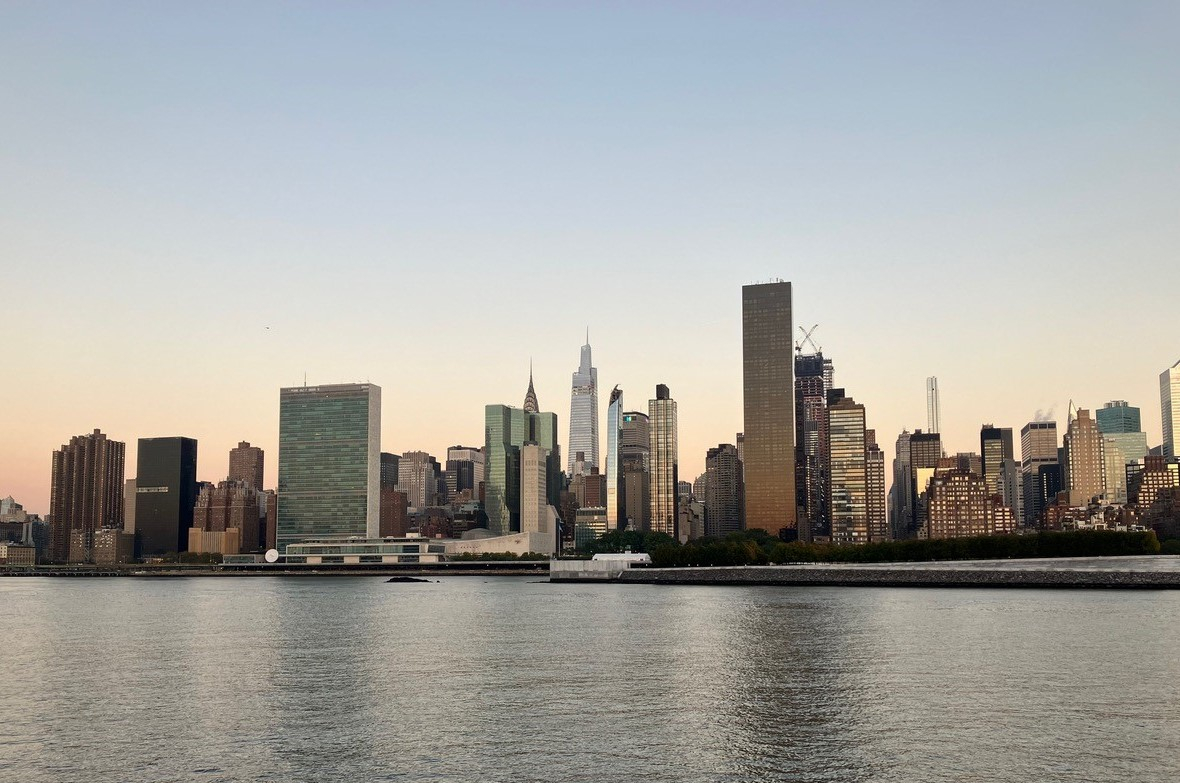
© Dominik Gross
In New York today, 125 UN Member States backed the creation of a UN framework convention on taxation. The countries of the Global South voted almost unanimously in favour. Surprisingly, some OECD members abstained. These were Norway, Iceland, Turkey, Mexico, Costa Rica and candidate country Peru. Colombia and Chile actually supported the resolution. Switzerland, along with all other OECD countries, including the US, the UK and the EU, rejected it en bloc. The decision is historic: such a convention had already been mooted in 2015 at the Third Conference on Financing for Development in the Ethiopian capital Addis Ababa, but was ultimately not included in the Addis Ababa Action Agenda (AAAA) adopted at that time. For the first time in the century-long history of multilateral tax policy, the UN is witnessing the creation of a truly global forum with legally binding decision-making, where all countries can negotiate and vote as equals on the future rules of international tax policy. The principles and elements of the convention will be defined over the coming year: for example, tax transparency and the taxation of multinationals or offshore assets.
There are a number of reasons why what was utopian for the global tax justice movement ten years ago has now become possible. The first and most important is the failure of the OECD – the Organisation for Economic Co-operation and Development. Over the past 15 years, it has failed to introduce tax reforms that would have raised substantially more tax revenue for the countries of the Global South. To be sure, the OECD has recently tried to shed its image as an exclusive club for the richest countries (there are only 38 members). It has also sought to dispel the widespread impression that it is only concerned with securing (tax) privileges for its members. As a result, non-members have been able to take part in negotiations since 2016. However, the introduction of a minimum tax for global companies is of little benefit to the countries of the South that make up the G77 at the United Nations (a group that now has 134 members). Countries such as the US, Ireland and Switzerland, for example, have turned their recent corporate tax reform into a rewards programme for low-tax countries.
This is why the G77 countries have now turned to the UN. The OECD, for its part, may now see its relevance in international tax policy issues substantially diminished: leading countries such as the US, Canada, China and other Asian countries have in recent months raised doubts about their national implementation of the latest OECD reform. In Switzerland, the Swiss business federation Economiesuisse and other representatives of the business community have recently spoken out in parliament along these lines, calling for the introduction of the minimum tax in Switzerland to be postponed. All this is grist to the UN tax mill. If the countries of the North block progress there, the result could be a global corporate tax system in the form of a one-sided patchwork that serves neither the interests of companies nor those of countries. This is exactly what the OECD was trying to prevent during its last reform period, but it is failing precisely when it comes to implementation by individual countries and their willingness to push ahead with OECD reforms. The first pillar of the reform, the reallocation of some taxing rights over companies from home jurisdictions to market jurisdictions, is falling by the wayside in Paris.
The USA, EU and Switzerland must shift positions
In recent days, prominent economists and former politicians such as Joseph Stiglitz, Jayati Gosh, Thomas Piketty or Thabo Mbeki, have come out in favour of a UN tax convention. The Global Alliance for Tax Justice, of which Alliance Sud is a member, has been campaigning for this for decades. We urge Switzerland to play a constructive role in the forthcoming negotiations on the implementation of the convention. So far it has been most notable for its disregard for the project. In the context of its current Security Council mandate, Switzerland – still seen abroad (and rightly so) as an old-fashioned tax haven – now has a unique opportunity to act as a bridge-builder at the UN and as a stabilising force between the blocs in the field of economic policy. Such a stance would be consistent with its campaign slogan for the Security Council: "A Plus for Peace". Finally, a global tax policy that raises revenue for all countries is also a security policy, because sufficient tax revenue is the basis for a strong community with good education, public infrastructure and an efficient social and health sector. These are key components of poverty reduction, as for the promotion of democracy, migration management, and the prevention of terrorism. Last but not least, greater global tax fairness is essential in order to finance holistic and sustainable development around the world, which the international community hopes to achieve by 2030 through the UN's Sustainable Development Goals. The past 10 years have shown that in this regard, the OECD is incapable of delivering. Like all other "blockers" from the North, Switzerland too should change its position and contribute constructively to the drafting of the convention.
Greater economic policy cooperation in a divided world
The current developments in tax policy at the UN also have a geopolitical component: the first UN resolution on strengthening tax policy was unanimously adopted by the General Assembly a year ago. Given the geopolitical situation at the time, the Northern countries did not dare to further alienate the G77 countries after their anger over the global response to the pandemic (vaccination inequality), the largely unmitigated consequences of the war in Ukraine for the Global South (food crisis) and the climate and debt policies of the North (little understanding of the situation in the South). They were anxious not to drive the South further into the arms of Russia and China. Abandoning the willingness shown a year ago to engage in fiscal and hence economic cooperation would be highly risky for the West. A constructive approach, on the other hand, would create an opportunity to restore universalist perspectives, at least in tax matters, in a world where very strong centrifugal forces are currently at work.
Share post now
Article
Tomatoes with a bitter aftertaste
22.03.2020, Trade and investments
Cofco Tunhe, the world's second-largest producer of canned tomatoes, operates in Xinjiang, where China oppresses millions of Uyghurs. The Cofco Group has set up its global trading headquarters in Geneva. Switzerland must act.
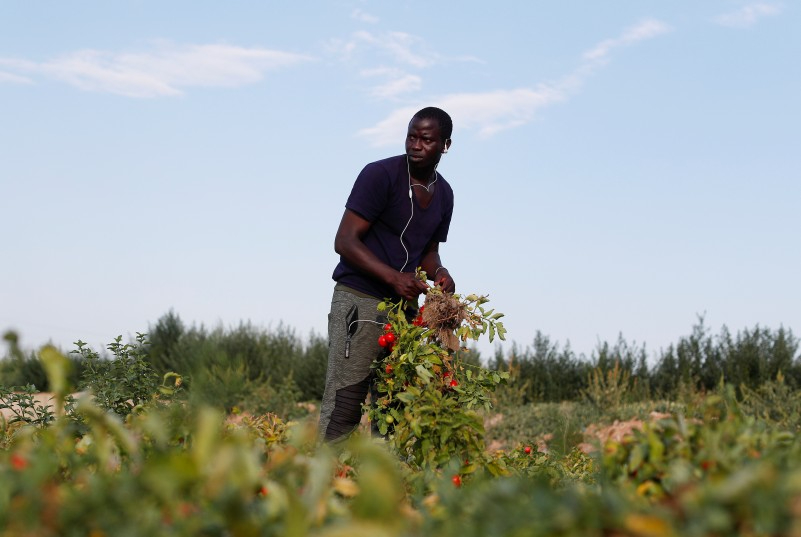
People like Idrissa Diassy (24) from Senegal are victims of globalised tomato production. He works far away from home near Foggia in southern Italy.
© Alessandro Bianchi / Reuters
Share post now
Article
Rolling back globalisation – slowly but surely
22.06.2020, Trade and investments
The call can no longer be ignored, production offshored to low-wage countries must be brought back. The more pressing a paradigm shift, the more careful the approach must be. Otherwise developing countries could yet again pay the price.

On Ilha de Cabo, an island off the coast of the Angolan capital Luanda.
© Alfredo D’Amato/Panos
Share post now
Article
Mercosur: fragmented impact assessments
09.12.2020, Trade and investments
After the conclusion of negotiations on the free trade agreement with Mercosur countries, the State Secretariat for the Economy commissioned an impact assessment regarding selected environmental issues. Social affairs and human rights were left out.

Use of pesticides for large-scale cultivation of GM soy in Uruguay. The feed is exported to China and the EU.
© Joerg Boethling
Share post now
Article
Tanzania plans to work the largest nickel deposit
19.03.2021, Trade and investments
The Tanzanian Government has signed an agreement on nickel mining with a British corporation under which profits will be split equally. State interventions can also be observed in neighbouring Zambia.
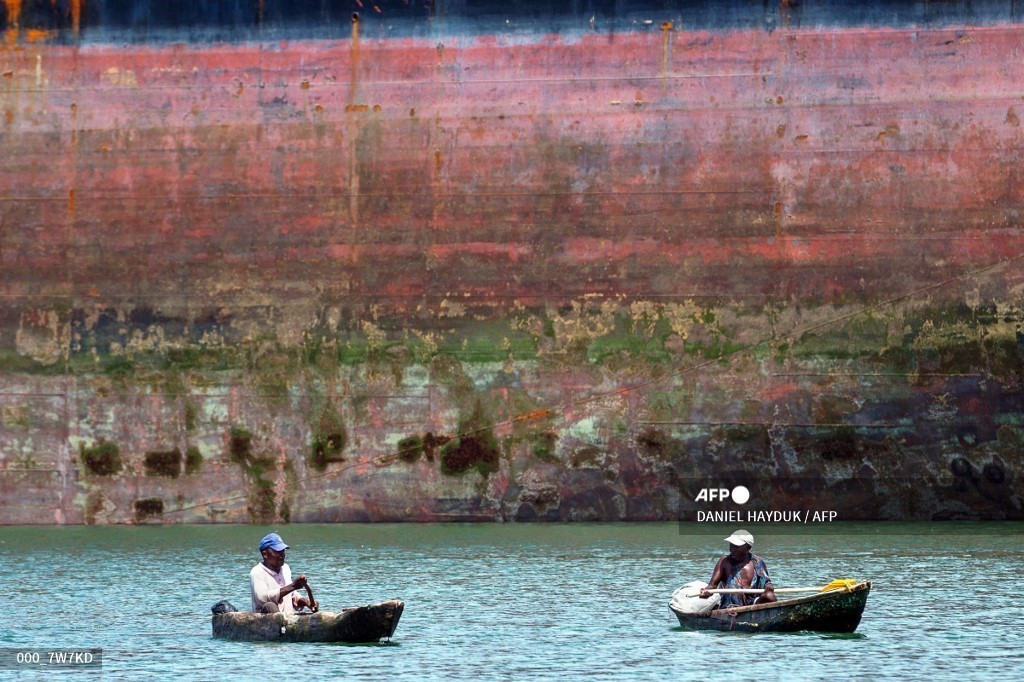
Two fishermen row in front of the Marshall Islands-flagged oil tanker "Miracle" after it ran aground in the mouth of Dar Es Salaam harbor on February 13, 2016.
© Daniel Hayduk / AFP
Share post now



